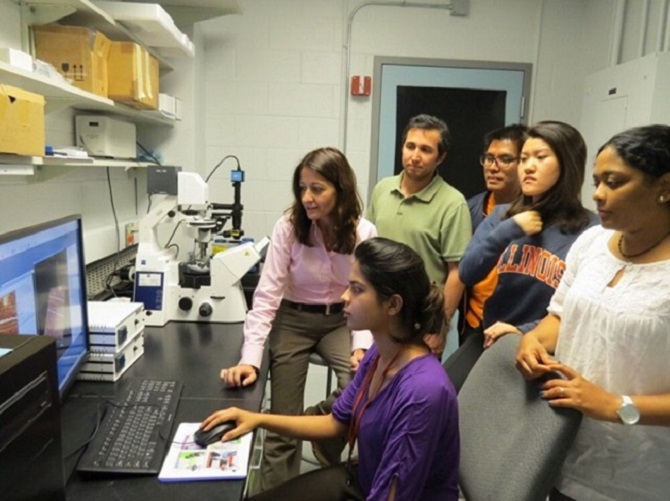 Dr Rosa Espinosa-Marzal and members from her research group discuss results from their JPK NanoWizard® AFM system at the University of Illinois at Urbana-Champaign.
Dr Rosa Espinosa-Marzal and members from her research group discuss results from their JPK NanoWizard® AFM system at the University of Illinois at Urbana-Champaign.
JPK Instruments, a world-leading manufacturer of nanoanalytic instrumentation for research in life sciences and soft matter, reports on the breadth of research applications where their NanoWizard® AFM system is being used in the Smart Interfaces in Environmental Nanotechnology Group under the leadership of Associate Professor, Rosa M Espinosa-Marzal.
Dr Rosa M Espinosa-Marzal is an Associate Professor in the Department of Civil & Environmental Engineering at the University of Illinois at Urbana-Champaign. The goal of her research is to design innovative systems and improved materials that can solve environmental problems of our society by applying fundamentals of surface and colloidal science, materials chemistry, and nanotechnology.
The central theme of her research group, Smart Interfaces in Environmental Nanotechnology (SIEN), is to design, synthesize, characterize and develop a fundamental understanding of bioinspired materials and of (bio) interfaces, also under nanoconfinement. Atomic force microscopy, AFM, is a vital tool for these studies.
Speaking about her group and their experiences since the starting of their use of the JPK NanoWizard® AFM system, Dr Espinosa-Marzal says;
My team of researchers is looking at a broad range of materials which require imaging in fluids to a high level resolution. The ability to measure low noise, high resolution force curves is of particular value as is the capability of working in liquid environments without the fear of damaging the piezo or sample.
My students have made many positive comments which are important to me. I am confident that their imaging is of the quality they need to complete their research assignments.
Dr Rosa M Espinosa-Marzal - University of Illinois
Picking out some of the projects where the NanoWizard® is being successfully used, it is revealing to hear the comments of the SIEN group members describe what makes them particularly pleased with the performance of the system. In one project which is setting out to understand the structure of water at the interface with 2D materials such as graphene, the biggest challenge is to make high resolution, force spectroscopy measurements.
Operating in liquid the NanoWizard® has produced high resolution phase images in AC mode that reveal the contamination on the graphene surface. Ultimately, the group hopes to study the layering of water molecules and ions on the graphene surface, which can be used as a possible interface for water purification.
Imaging soft structures in aqueous environments is the challenge of the researchers developing model cell membranes. These are tri-layered soft structures, with interfacial and mechanical properties similar to a cell membrane. These require a low noise system to both image and perform nanomechanical characterization with QI™ mode of individual layers and the complete stratified structure.
In a biofilm study, one researcher is looking to understand the precipitation of calcite in biofilms found in drinking water distribution systems. Here, colloidal AFM probes are applied to make surface force measurements on heterogeneous soft composites. These are used to determine mechanical forces of the films including adhesion and detachment forces.
The combination of AFM with an inverted microscope has been invaluable here using JPK's patented Direct Overlay™ feature to identify appropriate areas to image and ultimately to generate force maps which allow the understanding of the spatial variability of the mechanical properties for mineralized and non-mineralized samples.
Other projects include the study of biomineralization (imaging amorphous calcium carbonate) and how ionic liquids respond to nanoscale confinement and to surface heterogeneities. These just further illustrate the versatility of the JPK NanoWizard® in a multi-user research group.
For more details about JPK's NanoWizard® AFM and their applications for the bio & nano sciences, please contact JPK on +49 30726243 500. Alternatively, please visit the web site here or see more on Facebook and on YouTube